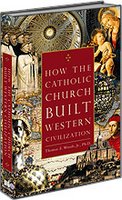
How the Catholic Church Built Western Civilization by Thomas Woods, Jr.
2005, Regnery Press, 256 pages, hardcover, Catholic
ISBN: 0895260387
Available from booksellers everywhere.
Thomas Woods, Jr. wrote a book to amend the erroneous attitude prevalent in society today – the Catholic Church has had only a negative impact on Western Civilization. Titled, How the Catholic Church Built Western Civilization, Dr. Woods, a history professor at a community college in New York, details the many contributions of the Catholic Church throughout history, primarily during the “Dark Ages” and “Middle Ages”.
From science to natural law, from the university system to the system of architecture, from the theories of free-market economies to the theories of morality, Dr. Woods details the influence and innovations of the Catholic Church.
This is not an unbiased, unemotional textbook. Dr. Woods states from the beginning that he is trying to show his students, and his readers, that the Church was in the forefront as the Western World began to civilize, began to make laws to protect the innocent, began to build and trade and participate in the world. Woods’ love of his Church and desire to set the record straight are prevalent throughout the text.
Using contemporary and modern scholars’ work, Dr. Woods defends his thesis admirably. Often quoting even those who are known anti-Church voices – including Martin Luther -- the history professor gives his reader lessons on the Benedictines’ actions which helped spread the Gospel and keep the “light of civilization” burning during the reign of Barbarianism known as the “Dark Ages”. He also gives a detailed account of the spread of monasticism and the many examples of the spread of practical, technical, charitable and educational skills accomplished by these monks.
Today’s university system is also beholden to the Church for the ability to debate, discover and develop new theories of life. He explains that the creation of the university system, directed by the Church, was committed to reason and rational argument and that there was a spirit of inquiry that has amounted to “a gift from the Latin Middle Ages to the Modern World”. Further, the Church is responsible for retaining much of the valuable scholarship from the ancient times: “massive translation efforts brought forth many of the great works of the ancient world….including the geometry of Euclid; the logic, metaphysics, natural philosophy and ethics of Aristotle; and the medical work of Galen.”
Woods explains that science is another field where the Church has been unfairly disparaged in recent times. Astronomy (even with the problems with Galileo), optics, biology, geology, seismology are just a few of the subjects where Catholic religious and laymen delved and developed theories and understandings.
Law – natural, international and modern – can also be tracked to the influence and innovation of the Catholic Church. Economics and the free-market theories are a direct contribution of Jesuit scholars – long before the eighteenth century theorists who get the bulk of the credit for free-market theories.
Dr. Woods’ book can become a bit didactic in his vehemence to set the record straight. The reader must understand that this book has a stated bias and must further understand that Dr. Woods is championing a cause that negates much of the history all of us have learned. That said, this is a book that all Catholics should read – a book that will help us all to explain to others the great contributions of our Church over the past two centuries. Interestingly, Southern Catholic College, a newly formed Catholic school in Georgia uses this book for their Freshman History text book.
Reviewed by: Mary C. Gildersleeve

No comments:
Post a Comment